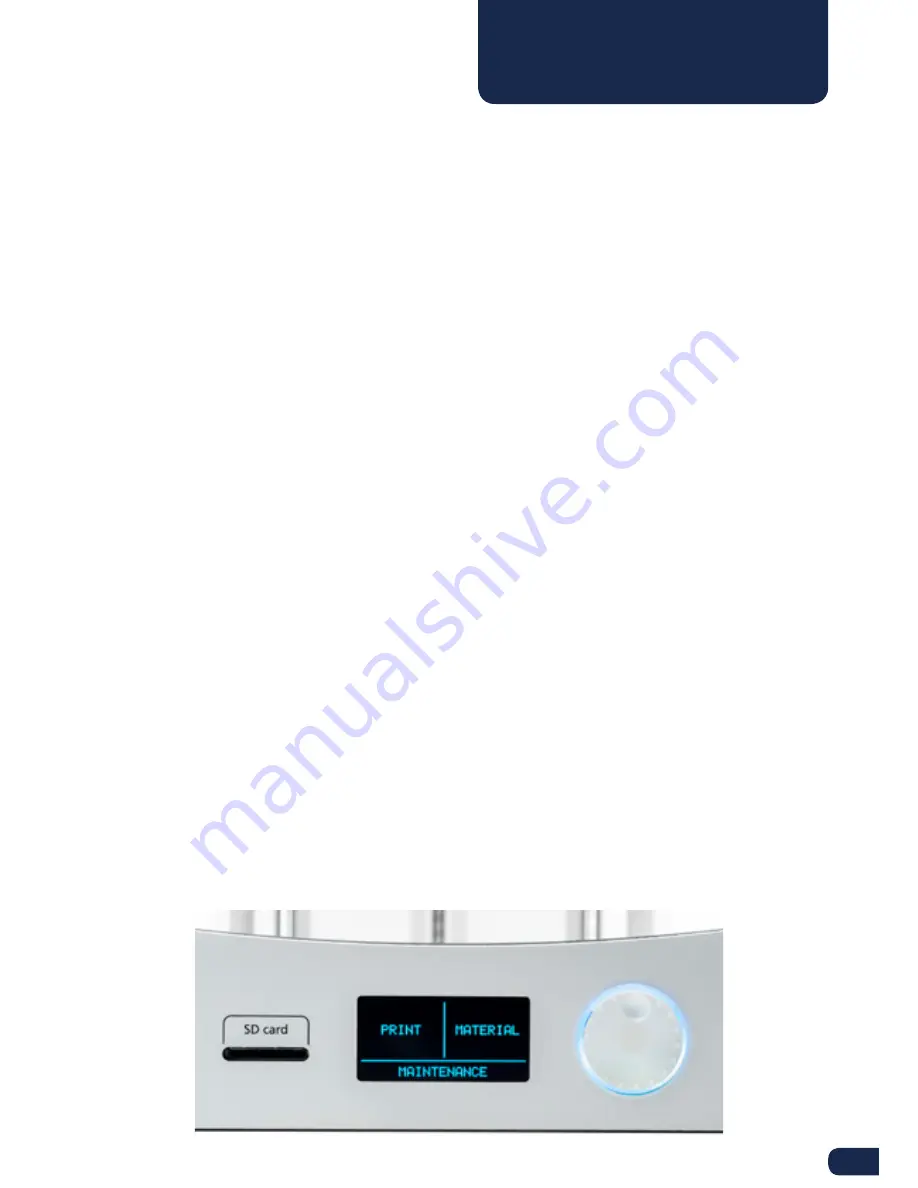
19
The display at the front side of the Ultimaker 2+ shows all the necessary information for setting up and using your
Ultimaker 2+. You can navigate through menus by rotating and/or pushing the button at the right side of the display.
Rotate to select or control an action; push to confirm an action. When pushing the button you will hear a “beeping”
sound to confirm the action. A blinking button means the Ultimaker 2+ is waiting for user input.
When turning on your Ultimaker 2+ after the first use, you will always see the Ultimaker logo first after which the main
menu appears. The main menu offers three options: “Print”, “Material” and “Maintenance”.
PRINT
The “Print” menu allows you to select one of the print files from the SD card. Press the button to start.
MATERIAL
In the “Material” menu, you can either change the filament on your Ultimaker 2+ or change the settings of material
profiles. When selecting “Change”, the Ultimaker 2+ will start the procedure as described in “LOADING AND CHANGING
FILAMENT” on page 22. In the “Settings” menu, you can select material profiles and change their settings in the
“Customize” menu.
MAINTENANCE
The “Maintenance” menu offers various options. By selecting “Build plate” you will be guided through the bed leveling
steps. In the “Advanced” menu, several options can be selected in order to perform certain actions manually or change
machine settings. These are the options:
•
LED settings
Change the settings of the LED lights in your Ultimaker 2+.
•
Heatup nozzle
Set custom temperature to manually heat up the nozzle.
•
Heatup buildplate Set a custom temperature to manually heat up the heated bed.
•
Home head
Homes the head in the left back corner of the Ultimaker 2+.
•
Lower buildplate
Moves the build plate to the bottom of the Ultimaker 2+.
•
Raise buildplate
Moves the build plate to the top of the Ultimaker 2+.
•
Insert material
Heats up the nozzle after which you can insert filament.
•
Move material
Heats up the nozzle after which you can use the scroll wheel to forward the material.
•
Set fan speed
Set the speed of the two fans at the sides of the print head.
•
Retraction settings Customize the settings for retraction.
•
Version
Shows the current firmware version on the Ultimaker 2+.
•
Runtime stats
Shows for how much time the Ultimaker 2+ has been on and printing.
•
Factory reset
A complete reset of your Ultimaker 2+ through which you can completely recalibrate it.
FINE-TUNING
You can fine-tune the settings during the printing process. This allows you to get full control over the printing process
and helps you achieving the best print results. You can do this by accessing the “Tune” menu during printing. The
“Tune” menu basically shows you the same settings as in the “Advanced” menu, which means that you can change
settings such as the temperature and speed of printing. Furthermore, it is possible to select “Pause”, after which you
can change the filament in the middle of a print and resume again.
DISPLAY AND CONTROLLER
















































